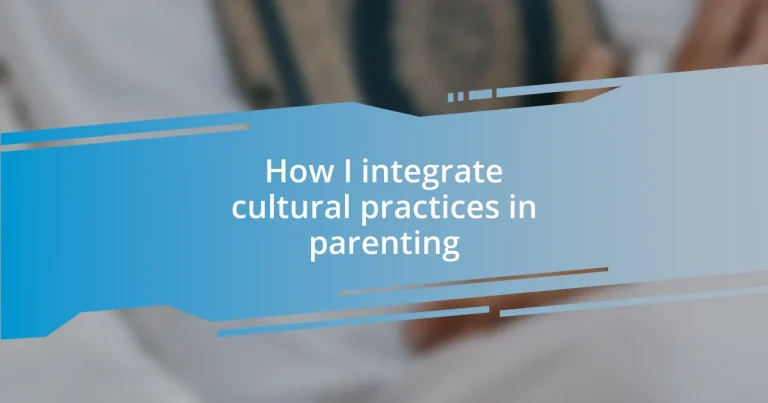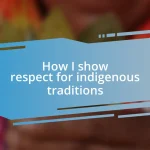Key takeaways:
- Cultural practices in parenting shape family dynamics, emphasizing the importance of community support and heritage.
- Integrating traditions into daily life, such as storytelling and cooking sessions, strengthens family bonds and enriches children’s understanding of their identity.
- Balancing tradition with modern parenting requires open discussions about cultural differences, fostering inclusivity and curiosity in children.
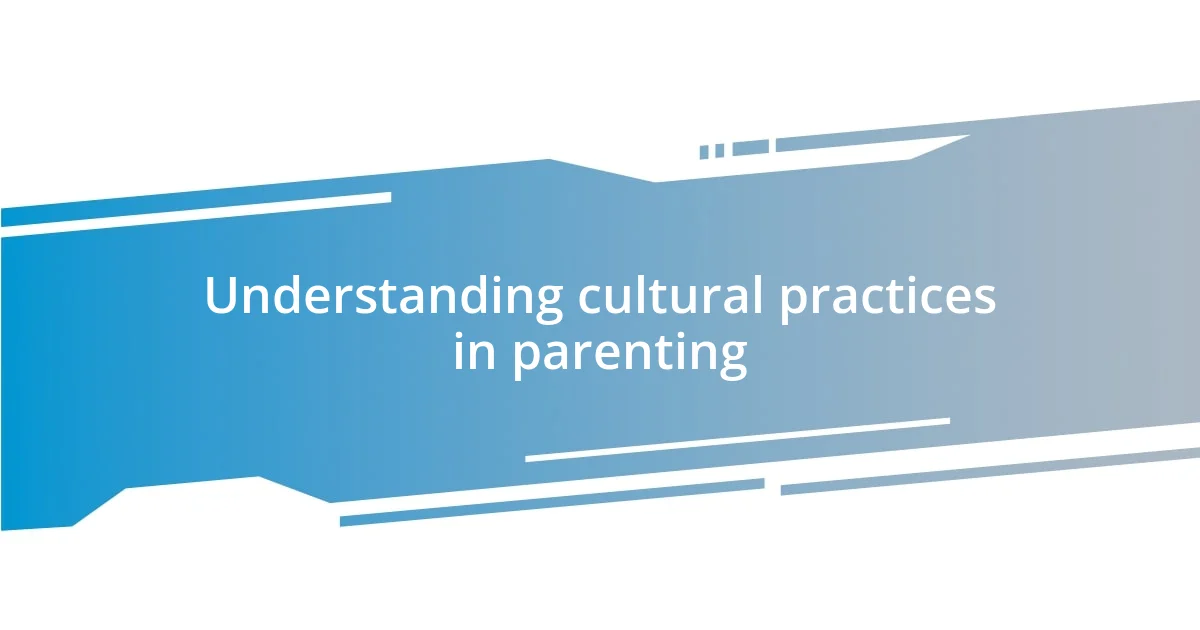
Understanding cultural practices in parenting
Cultural practices in parenting are often deeply rooted in tradition and identity, shaping how families nurture, discipline, and support their children. I remember visiting a friend’s home during a traditional holiday celebration, where their entire family came together for rituals and storytelling. It struck me how these gatherings reinforced values and heritage, making me ponder: how many of us truly embrace and pass on our cultural practices?
I see parenting as a canvas wherein cultural backgrounds paint unique strokes of influence. For instance, in my own upbringing, the focus on communal responsibility often meant that every adult in our neighborhood felt invested in my upbringing. This made me feel supported and connected, but I can’t help but ask—do we, in our individualistic society, sometimes overlook the strength in these communal ties?
Understanding the nuances of cultural practices requires us to reflect on our experiences and the emotional weight they carry. In my journey, there have been moments where cultural expectations clashed with modern parenting styles, leaving me questioning my approach. It’s these clashes that reveal profound insights; how can we honor our heritage while adapting to a changing world?

Identifying your cultural values
Identifying your cultural values is essential in shaping the parenting style you choose. The values I hold dear often stem from moments spent with my grandparents, who shared stories of their childhood. These conversations cemented my understanding of family loyalty and respect for elders, values that I consciously promote in my own parenting. Have you ever taken the time to think about how your childhood experiences influence your views?
As I navigate the complexities of modern parenting, I’ve found that recognizing cultural values helps ground my decisions. For instance, during family gatherings, I prioritize traditions like shared meals and communal celebrations, which help instill a sense of belonging in my children. It’s fascinating how these rituals, though sometimes challenging to manage, highlight the importance of family unity. Have you considered how rituals from your cultural background can enrich your family life?
In reflecting on my cultural values, I realized that they serve as a compass for my children’s development. I often discuss with them the significance of community support, which I learned from my own upbringing in a tight-knit neighborhood. These discussions inspire them to appreciate not only their identity but also the bonds that tie them to others. Isn’t it incredible how our values can shape the next generation?
| Cultural Values | Examples from My Life |
|---|---|
| Family Loyalty | Learning stories from my grandparents. |
| Respect for Elders | Encouraging my children to listen to older relatives. |
| Community Support | Participating in neighborhood events as a child. |

Incorporating traditions into daily life
Incorporating traditions into daily life can create a rich tapestry of experiences within our families. I’ve found that weaving in elements of my cultural background makes even mundane moments feel significant. For example, every Sunday, we have a family cooking session where we prepare dishes from our heritage. This time together not only teaches cooking skills but also sparks conversations about family histories. I cherish how my children eagerly ask questions about the origins of certain dishes, deepening their understanding of where they come from.
Here are some simple ways to integrate traditions into daily routines:
- Storytelling Nights: Share personal or cultural stories during bedtime to instill values and foster imagination.
- Weekly Rituals: Dedicate a specific day for family traditions, like game nights that feature games from your culture.
- Cultural Celebrations: Mark significant cultural holidays not just as events but as weeks of activities leading up to the celebration.
- Language Practice: Incorporate words and phrases from your heritage language into daily conversations.
- Art and Craft Projects: Create art that reflects your cultural symbols or stories, engaging children in creative learning.
Every time I incorporate these practices, I feel a warm connection to my roots. I recall an afternoon where we crafted paper lanterns for a festival. The joy on my children’s faces as they learned about the significance of the lanterns reminded me of my own childhood. It’s moments like these that reinforce not just traditions, but the emotional bonds that form when we delve into our shared heritage.
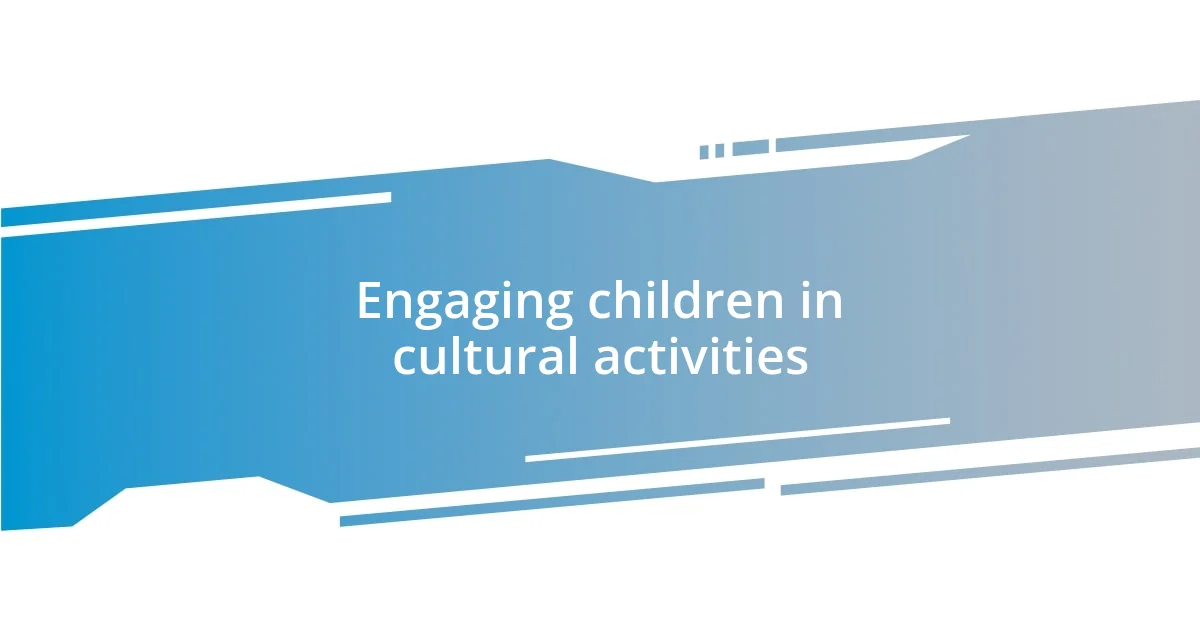
Engaging children in cultural activities
Engaging children in cultural activities is not just about the activities themselves but also about the feelings and connections they foster. I remember the first time my children participated in a traditional dance for a cultural festival. Their initial shyness quickly transformed into excitement as they learned the steps. Watching them blend laughter with movement was a heartwarming reminder that cultural engagement can break barriers and create joyful memories.
One way I find especially effective is through hands-on experiences. For instance, during a recent family outing, we attended a local art fair showcasing indigenous artists. I encouraged my kids to interact with the artists, asking questions about the stories behind their work. Their curiosity ignited a discussion that spanned the entire ride home. It’s amazing how these encounters can leave lasting impressions, isn’t it? Art has a unique ability to connect generations, and in those moments, I saw my children starting to appreciate the beauty of our shared history.
Involving children in cultural activities often opens doors to deeper conversations about identity. After attending a traditional storytelling event, my eldest, who usually shies away from sharing, began to recount stories he had heard from our family’s past. It was as if the richness of our heritage unlocked a part of him that longed to connect. These types of engagements not only strengthen their understanding of our culture but also pave the way for them to express their own narratives. Have you noticed how exploring cultural practices can transform your child’s confidence and sense of belonging?
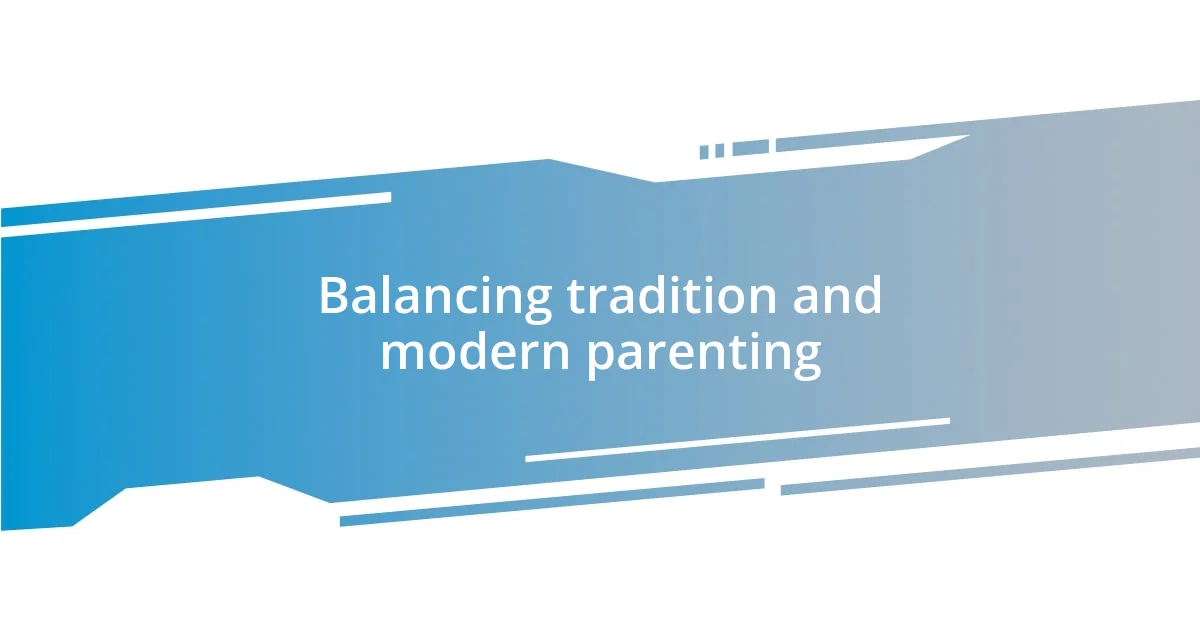
Balancing tradition and modern parenting
Balancing tradition and modern parenting can seem daunting, yet it’s a dynamic journey that enriches both my children’s upbringing and my own understanding. I often find myself reflecting on my childhood experiences while striving to adapt them to the fast-paced world my children live in today. For instance, I introduced my kids to a digital storytelling app that allows them to narrate their own stories inspired by those I grew up with. This blend of old and new creates a bridge to our heritage while embracing the technology they love.
One challenge I face is finding the right moments to integrate traditional practices without overwhelming my children. I remember a holiday season when I planned a family gathering that melded our cultural customs with modern staples like a themed movie night. As we watched films that showcased our traditions, the kids could relate to the contemporary context, sparking their interest in our history. Isn’t it fascinating how merging different layers of experiences can ignite curiosity in young minds?
It’s important for me to encourage open discussions about how our traditions align with their aspirations in a rapidly changing world. After a recent family dinner that featured dishes from my childhood, my youngest voiced how they loved the food but also wanted to explore foods from other cultures. This was a pivotal moment that made me realize balancing tradition and modernity is not just about preservation but also about evolution. How can we ensure our children respect their heritage while being open to the ever-changing landscape of global cultures?
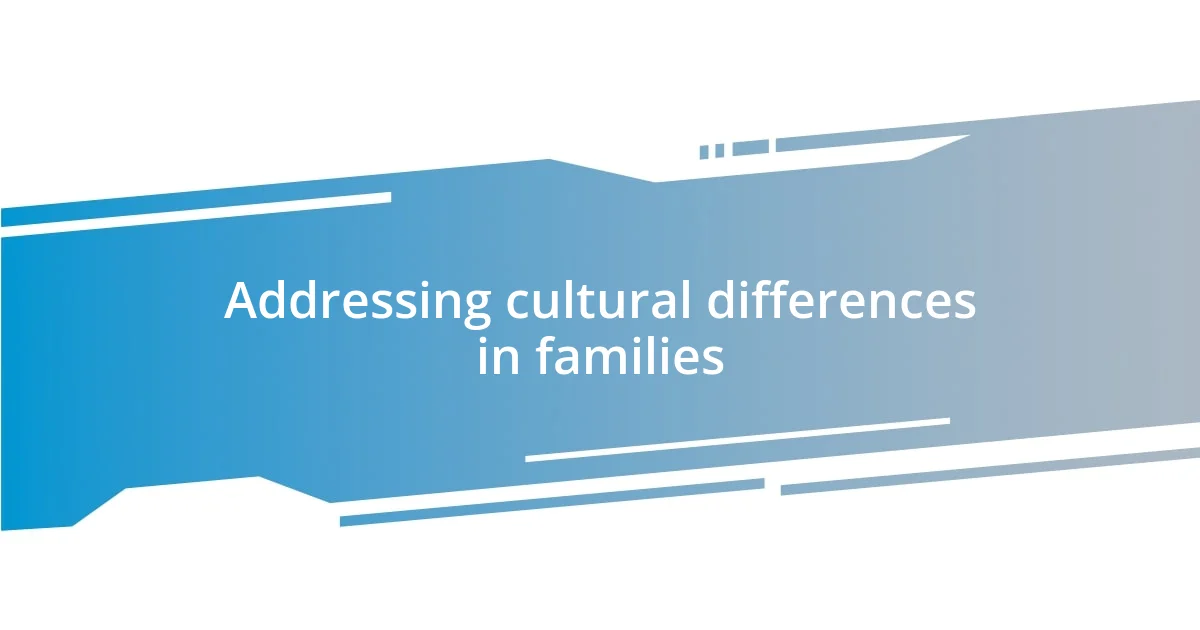
Addressing cultural differences in families
Addressing cultural differences within families isn’t just beneficial; it’s essential for fostering understanding and connection. I recall a conversation with my neighbor, who comes from a different cultural background. We were discussing our children’s varying approaches to discipline, and I noticed how our upbringings shaped our perspectives. By sharing stories and experiences, we found common ground, highlighting how cultural differences can lead to enriching discussions rather than misunderstandings.
I often remind myself that acknowledging these differences can help us navigate parenting more effectively. For instance, when my children spend time with friends from diverse backgrounds, I’ve learned to embrace questions that arise about their practices and beliefs. One day, my daughter asked why her friend’s family celebrated a specific festival. Rather than brushing it off, I encouraged her curiosity, which sparked a lively family discussion about inclusivity and respect for others’ traditions. It’s moments like these that crystallize the importance of cultivating an open-minded environment where dialogue thrives.
Additionally, integrating cultural practices from our family and our friends creates a blended tapestry of values and traditions. I’ve started hosting potlucks where our friends share dishes from their cultures while encouraging my kids to ask about the origins of each meal. This not only broadens their culinary horizons but also nourishes their empathy and cultural appreciation. Have you ever considered how foods can tell stories that transcend generations and histories?












